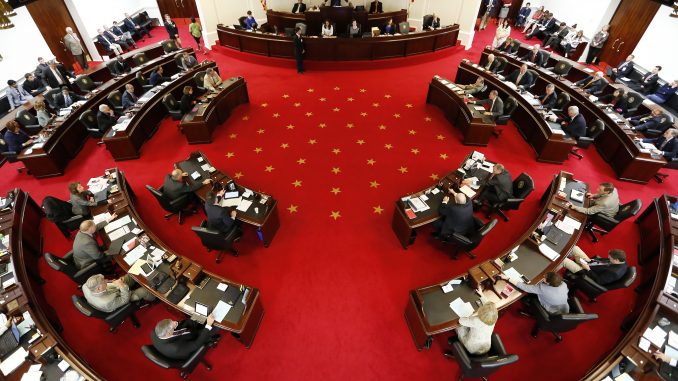
ALBEMARLE — Candidates and voters across North Carolina are still sorting through new districts at almost every level of government following lawsuits, legislative action and more lawsuits.
When 2018 rolls around, voters in Stanly County may not be voting for the same candidates or in the same districts for several important government offices. The entirety of the county will remain in the 8th Congressional District — the only constant for legislative positions.
Starting in 2018, Stanly County will be divided between two N.C. House Districts. A majority of the county will be in House District 67 which will also include a significant portion of Cabarrus County. Voters in northeastern Stanly County will find themselves in House District 66 along with all of Montgomery and Richmond counties.
Since 2011, Stanly County has been in N.C. Senate District 25, a five-county district that includes all of Stanly, Anson, Richmond and Scotland along with the southern portion of Rowan. Under the new districts enacted by the General Assembly this summer, Stanly and Rowan will combine to form Senate District 33. Anson, Richmond and Scotland will add Moore County in Senate District 25.
New maps were called for by courts when portions of 2011 Republican-drawn maps were ruled unconstitutional due to racial gerrymandering. The new maps came after weeks of adopting criteria, considering public input and tweaking district lines to address members’ concerns. The Joint Redistricting Committee in the legislature also voted to ban the use of racial data in constructing the newly drawn maps. The priorities for map drawers were to have more compact districts while minimizing county and precinct splitting.
“This map splits 39 counties; the fewest of over two decades of maps,” said House redistricting chair David Lewis (R-Harnett). “This map is more compact than maps enacted by the General Assembly over the past two decades. This map splits fewer precincts than maps produced over the past two decades. It splits 39 precincts total, but 30 of those are retained from unaffected county groupings.”
While additional legal challenges await the enacted maps, candidates are making choices on their political futures based on the newly drawn lines. In the wake of the redistricting bill passing, Sen. Bill Cook (R-Beaufort) announced that he would not seek re-election. Cook represents District 1 in the N.C. Senate and his is among those that shifted in the new maps, putting him in an overlapped area with another incumbent. Rep. Bob Steinburg, an Edenton Republican who represents the sprawling 1st District in the N.C. House, announced that he will run for a newly drawn Senate seat that includes the Outer Banks and areas around the Albemarle Sound.
In Stanly County’s new Senate District, two Republicans have announced their intentions.
Rep. Carl Ford (R-Rowan, Cabarrus) was the first to announce his candidacy. Ford, like Steinburg, is seeking to move from the House to the Senate.

“I felt like it was the direction that God wanted me to move in,” he said. He also cited his previous move from the Rowan County Commission in 2012 when then state Rep. Fred Steen left the state legislature to run for Congress which opened up the seat Ford currently occupies. As far as policy and politics go, Ford thinks he is a good fit in the state Senate. “They are a conservative body and I hope to fit right in,” he said.
Ford has represented the people of Rowan County in two different bodies — the county commission and state House — but said he is looking forward to learning more about Stanly County.
“Stanly is smaller than Rowan, but they are similar,” he said. “There are a lot of rural areas in both and both are starting to grow. Rowan and Stanly are tied into the Charlotte metro region as well as Cabarrus, which I have represented.”
As far as top issues go, Ford said economic growth and limited government are his goals.
“If you’ve got the infrastructure right, the businesses will come,” he said. “And, if you’ve got the tax structure right, the businesses will come. That’s most of the work right there.”
Bill Sorenson, of Norwood, announced his intentions to seek the new seat on Sept. 1. Sorenson, a Navy veteran and school teacher, has stated education policy was a primary factor in his decision to run.
“I have to do something to right some long-running wrongs, and I have exhausted every other option that I can think of,” Sorenson said in a Facebook post.
The 57-year-old Republican, who has not previously held public office, did not respond to requests for an interview, but did post on Facebook that he would “provide more information soon but intend to keep my political activities limited until after the holidays.”
Last Tuesday, the U.S. Supreme Court heard arguments in a case that could influence American politics for decades, particularly in N.C. The nine justices are considering the lawfulness of partisan gerrymandering, a long-standing practice of manipulating the boundaries of electoral districts to benefit one party. They are taking up a fight over electoral maps drawn by Wisconsin Republicans that a lower court ruled were designed to entrench themselves in power. The result of this case could impact maps across the country.
Despite the uncertainty, the political process continues to move as candidates bet their political futures on lines that are still under scrutiny.



